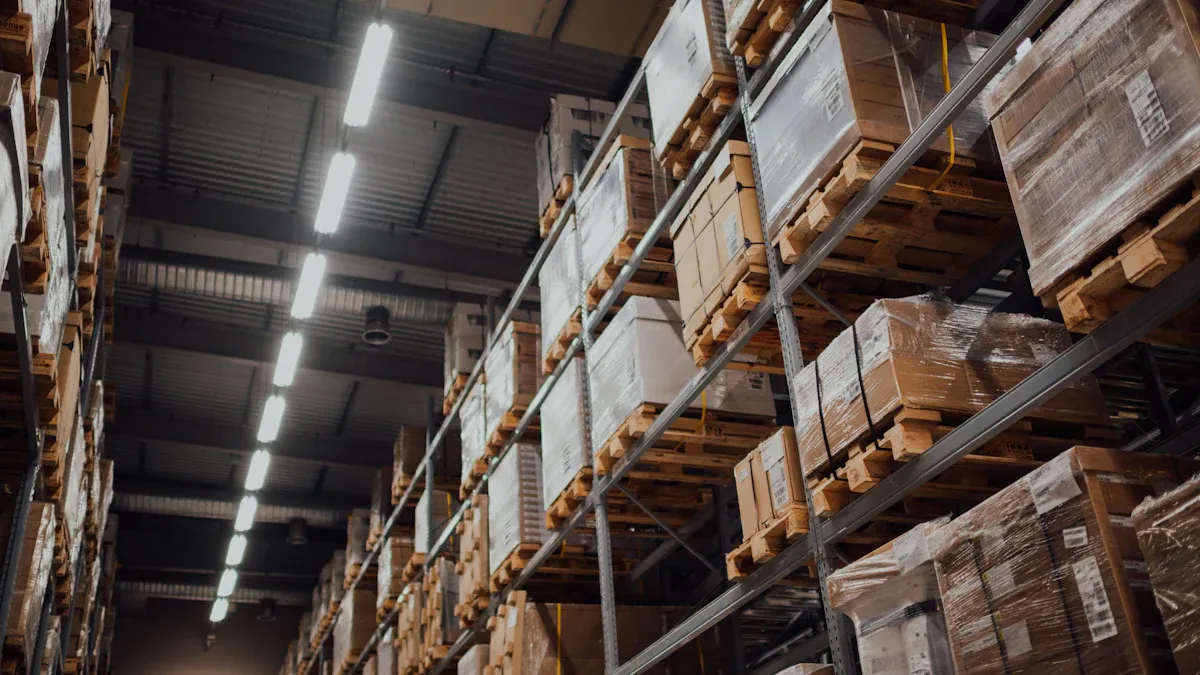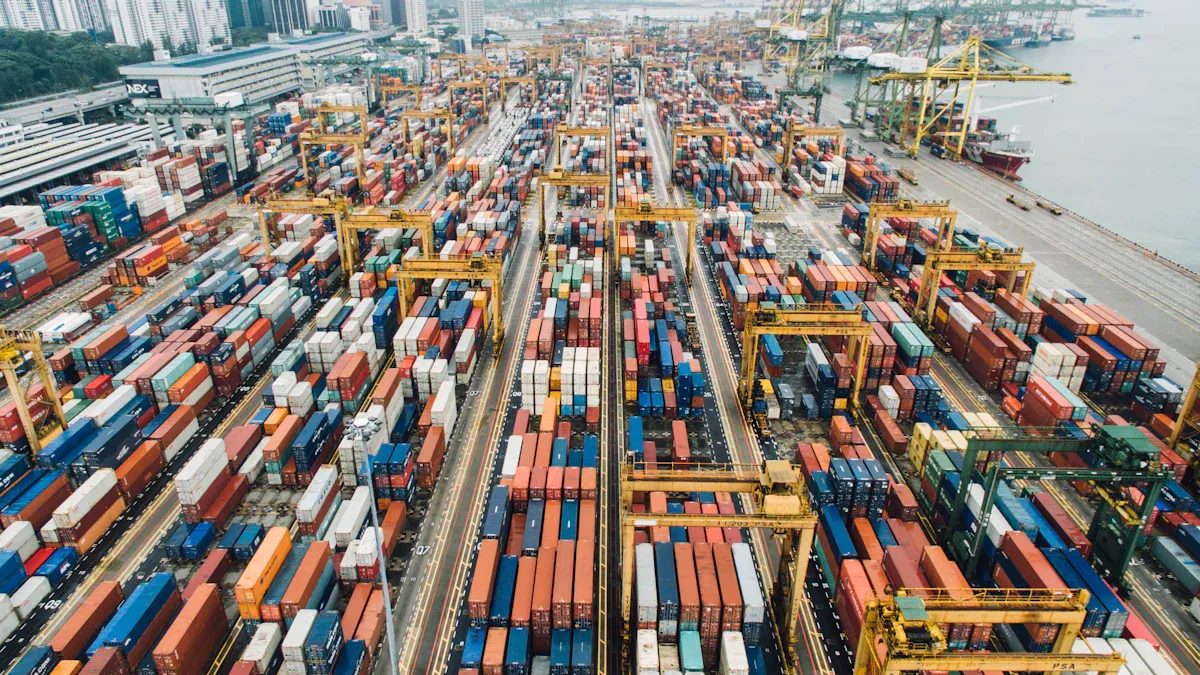National Logistics Day June 28 Explained and Why It Matters

You use products every day that travel thousands of miles before reaching your hands. National Logistics Day June 28 honors the people and technology that make this possible. The logistics industry helps move everything from food to medicine. Look at these numbers to see how big logistics is in the United States:
Metric | Value |
|---|---|
Market Size in 2025 | |
Market Forecast in 2033 | USD 3,814.7 Billion |
Market Growth Rate (2025-2033) | 8.5% |
Take a moment to think about how logistics professionals shape your world.
Key Takeaways
National Logistics Day on June 28 celebrates the vital role of logistics in our daily lives and the economy. It recognizes the hard work of logistics professionals who ensure products reach us safely and on time.
Logistics is more than just transportation; it includes warehousing, inventory management, and delivery. Understanding this helps appreciate how logistics supports businesses and communities.
You can participate in National Logistics Day by attending local events, sharing gratitude for logistics workers on social media, and learning more about the logistics industry.
What Is National Logistics Day June 28

Purpose and Recognition
National Logistics Day June 28 gives you a chance to learn about the logistics industry and its impact on your life. You see the results of logistics every time you buy groceries, order online, or receive medicine. This day recognizes the hard work of logistics professionals who keep supply chains running smoothly. You can use this day to thank the people who move goods across the country and around the world.
National Logistics Day June 28 is defined as a day to recognize and appreciate the importance of the logistics industry in both national and global economies. You celebrate this day every year on June 28. The day helps you understand how logistics supports businesses, creates jobs, and connects communities. Many people think logistics is only about trucks and shipping, but it covers much more. You find logistics in warehousing, inventory management, packaging, and delivery.
Logistics professionals view National Logistics Day as a significant occasion to honor their hard work and dedication, highlighting the importance of their roles in the supply chain and the connections they foster globally.
Here are some common misconceptions that National Logistics Day aims to address:
Logistics is only about transportation. You should know it includes the entire supply chain.
Logistics is not important for small businesses. Every business needs logistics to succeed.
Technology will replace human workers in logistics. People remain essential for decision-making.
Logistics is a back-end function. It affects customer satisfaction directly.
Logistics can be easily outsourced. Outsourcing brings challenges that you must consider.
History and Origins
You might wonder how National Logistics Day June 28 started. Logistics Plus, a company based in Erie, Pennsylvania, created the day in 2019. They worked with National Day Calendar to make it official. The goal was to honor the essential services and jobs provided by the logistics industry.
The story of logistics goes back hundreds of years. Marco Polo traveled the Silk Road, showing how logistics helped connect cultures and trade goods. Today, logistics supports modern supply chains and global commerce. You see its influence in every product that reaches your home.
Who Celebrates
Many organizations and countries recognize National Logistics Day June 28. You find celebrations in the United States, where Logistics Plus and other companies take part. India also shows growing interest in logistics, with potential for similar celebrations.
Country/Organization | Description |
|---|---|
United States | Celebrated on June 28, with participation from Logistics Plus, a key American logistics firm. |
India | Highlighted as having a growing recognition of logistics, suggesting potential for similar celebrations. |
National Day Calendar officially recognizes National Logistics Day. You see logistics companies, supply chain professionals, and business owners joining in. Schools and local communities may also take part to teach students about logistics and its importance.
Why It Matters
Impact on Daily Life
You experience the benefits of logistics every day, often without noticing. When you order a gift online, buy fresh produce at the store, or receive medicine at the pharmacy, logistics professionals make these moments possible. The industry connects you to products from around the world and ensures they arrive safely and on time.
Third-party logistics companies generated $213.5 billion in revenue in the U.S. in 2018.
The trucking industry contributed nearly $800 billion to the economy.
Logistics supports almost $2 trillion of the U.S. Gross Domestic Product (GDP).
You see logistics at work during holidays and special events. For example, transporting 250 million roses for Valentine’s Day or delivering food for Thanksgiving and Christmas depends on careful planning and coordination. In healthcare, logistics ensures timely delivery of medical supplies, medications, and even life-saving items like organs and blood. Manufacturing companies rely on logistics to receive materials on time, which helps prevent project delays.
Logistics operations guarantee the timely movement and storage of goods, which improves customer satisfaction and keeps businesses running smoothly.
Economic and Global Trade Role
You depend on logistics for a strong economy and global trade. The logistics industry creates jobs, supports businesses, and helps communities grow. When companies export goods, they often hire more workers to meet demand in foreign markets. Imports also create jobs in design, marketing, and distribution, helping businesses stay competitive.
The global freight and logistics market is projected to reach $18.69 billion by 2026, with steady growth.
The logistics market alone is expected to grow to $6.55 trillion by 2027.
Logistics makes international trade possible by moving, storing, and managing goods across borders. Efficient logistics systems help businesses expand into new markets quickly and improve inventory management. You benefit from a wider variety of products and better prices because logistics connects you to global suppliers.
How Logistics Supports Trade | Description |
|---|---|
Facilitates Movement of Goods | Ensures efficient transport and storage across borders |
Accelerates Market Expansion | Helps businesses reach new customers worldwide |
Improves Inventory Management | Optimizes stock levels to meet international demand |
Trade-related activities also create indirect jobs in transportation and logistics. Spending from these jobs boosts employment in other sectors. National logistics day june 28 highlights the importance of carriers and drivers who overcome challenges like supply chain uncertainty, fluctuating demand, and rising costs.
Advancements in Logistics
You benefit from new technologies that make logistics faster, smarter, and more sustainable. Big data analytics helps companies understand customer behavior and optimize supply chains. The Internet of Things (IoT) allows real-time tracking of goods and monitoring their condition during transit. Cloud computing improves data sharing and operational efficiency.
Blockchain technology secures transactions and improves supply chain transparency.
Automation speeds up processes like labeling and sorting.
Drones deliver packages and help manage warehouses.
Innovations such as automation and artificial intelligence (AI) have transformed logistics operations. Robots now pick, pack, and sort items, working without fatigue and reducing lead times. AI-powered systems analyze sales data to predict demand, choose the fastest delivery routes, and provide real-time updates to customers.
Benefit | Description |
|---|---|
Faster Order Processing | Facilities process thousands of orders per hour with automation |
Reduced Operational Costs | Robotics cut labor expenses and reduce costly errors |
Scalability | Automated systems handle peak seasons with ease |
Enhanced Accuracy | AI ensures precise picking and packing |
You also see logistics companies using technology to support sustainability. IoT and real-time monitoring help optimize routes and reduce emissions. AI and machine learning improve fuel efficiency by predicting demand and optimizing delivery schedules. Warehouse automation reduces waste, and blockchain ensures traceability for sustainable sourcing.
Companies that invest in sustainable logistics lower costs, improve their reputation, and meet stricter environmental regulations.
National logistics day june 28 reminds you of the challenges the industry faces, such as labor shortages, rising costs, and evolving customer expectations. Logistics professionals use advanced tools like AI-driven control towers and predictive analytics to monitor disruptions and keep supply chains resilient.
How It's Celebrated

Industry Events
You see many logistics companies organize special events for National Logistics Day. R&R is one company that acknowledges this day with activities for employees and partners. You might notice trade shows, conferences, and seminars that help people learn about new trends in logistics. These events give you a chance to meet industry experts and see how logistics works behind the scenes. Some companies host open houses or tours so you can explore warehouses and distribution centers.
R&R celebrates National Logistics Day with employee recognition.
Trade shows and conferences offer hands-on learning.
Companies host tours to show logistics operations.
Public Awareness
You find public awareness campaigns that teach you about logistics. Educational initiatives help you understand how products move from factories to stores. These programs promote transparency and share success stories from the industry. You learn about the challenges logistics professionals face, which helps you appreciate their hard work.
Schools and community groups run workshops.
Media outlets publish press releases about National Logistics Day.
Social media platforms use hashtags like #NationalLogisticsDay to encourage sharing and engagement.
You can follow news stories and social media posts to stay informed about logistics and its impact on your life.
Getting Involved
You can participate in National Logistics Day in many ways. Attend local events such as trade shows or conferences to learn more about logistics. Try online games that teach you about supply chains and transportation. Organizations like CJ Logistics America and MODE Transportation show appreciation by recognizing logistics professionals and their contributions. OSM Worldwide encourages companies to thank their teams publicly.
Play logistics-related games online.
Share gratitude for logistics professionals on social media.
Organizations can celebrate their teams with public recognition.
You help raise awareness and show support for the logistics industry by getting involved.
National Logistics Day June 28 matters to you and your community. You see its impact in daily life, economic growth, and career opportunities.
Key Reasons for Significance | Description |
|---|---|
Highlights the essential role of logistics | Recognizes the logistics industry's importance in the economy and daily life. |
Promotes awareness | Educates the public about logistics' impact on various sectors like retail, healthcare, and e-commerce. |
Recognizes contributions | Acknowledges the hard work and dedication of logistics professionals, especially during crises like the COVID-19 pandemic. |
You can explore logistics further with these resources:
You help your community by learning about logistics and supporting professionals who keep goods moving.
FAQ
What is the main goal of National Logistics Day?
You celebrate National Logistics Day to recognize logistics professionals and learn how logistics supports your daily life, the economy, and global trade.
How can you participate in National Logistics Day?
Attend local events.
Share posts on social media.
Thank logistics workers in your community.
Why does logistics matter to you?
Logistics helps you get food, medicine, and products quickly and safely. You rely on logistics for convenience, choice, and lower costs. 🚚
See Also
Streamlined Supply Chain Solutions For American Logistics Success
Key Strategies For Effective Management Of Global Logistics
Point-to-Point Logistics Systems Enhancing Global Operational Efficiency
Innovative Logistics Strategies Boosting Efficiency In Global Operations
PGL’s Knowledge Ensures Smooth Operation Of U.S. Supply Chains
